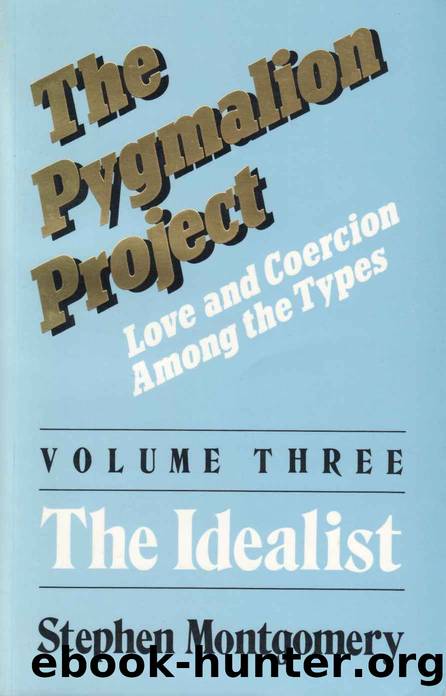The Pygmalion Project (Vol. III : The Idealist) (Love & Coercion Among the Types) (The Pygmalion Project: Love and Coercion Among the Types Book 3) by Montgomery Stephen

Author:Montgomery, Stephen [Montgomery, Stephen]
Language: eng
Format: epub
Publisher: Prometheus Nemesis Book Company
Published: 2012-09-28T16:00:00+00:00
* * *
Chapter 4: The Counselor
James: I guess it...feels good to help people.
Sarah: And that’s why you want to make me over in your image.
— Mark Medoff, Children of a Lesser God
Mentor Idealists (NFJs) are no more manipulative than Mediators (NFPs), and yet their greater assertiveness and decisiveness with their loved ones makes them appear more coercive. While Mediators, as we have seen, are what Keirsey calls “role-informative,” relying for the most part on tacit and oblique Pygmalion maneuvers, Mentors are “role-directive” in their relationships, which means they are quite comfortable taking control of their relationships, telling their loved ones how they ought to behave, and even suggesting what kind of person they should be. Mentors are so enthusiastic about personal development, and they are so quick and definite in their judgments of behavior and attitudes, that they seem almost unable to resist stepping in and advising others what to do, or be, or want, or feel.
Mentors, I should point out, have no wish to dominate their mates, and seem virtually unaware of their powerful directiveness. Like the Mediators, Mentors prefer harmony and cooperation in their relationships, and they see themselves as doing nothing more than enlightening their loved ones with their personal insights. Indeed, Keirsey remarks in Portraits of Temperament that Mentors are “surprised and nonplused when others balk or accuse them of being pushy, since they tend to see themselves as facilitative rather than directive, as catalysts rather than commandants.” For all their desire for smooth relationships, however, Mentors have a sometimes impatient sense of command about them, and for all their love of harmony, they have a judgmental cast of mind—and both of these traits distinguish them quite clearly from the Mediators.
Not that this directiveness is always overt. The introverted Mentors, the Counselors (INFJs), are exceptionally shy, sensitive people, with a complicated internal world—and with very nearly an aversion to interpersonal confrontation. And yet, while they might appear timid and sometimes flustered in public, Counselors work quite intensely in their closest relationships, exerting their influence on an intimate, often unconscious level. With their uncanny feel for the emotional lives of others, Counselors try to shape their loved ones from the inside out, with personal projections and attributions, with meaningful silences, as well as with any number of ethical directives or “should” statements.
Download
This site does not store any files on its server. We only index and link to content provided by other sites. Please contact the content providers to delete copyright contents if any and email us, we'll remove relevant links or contents immediately.
Rewire Your Anxious Brain by Catherine M. Pittman(17589)
Talking to Strangers by Malcolm Gladwell(11879)
The Art of Thinking Clearly by Rolf Dobelli(8842)
Mindhunter: Inside the FBI's Elite Serial Crime Unit by John E. Douglas & Mark Olshaker(7834)
Becoming Supernatural by Dr. Joe Dispenza(7106)
Change Your Questions, Change Your Life by Marilee Adams(6641)
The Road Less Traveled by M. Scott Peck(6635)
Nudge - Improving Decisions about Health, Wealth, and Happiness by Thaler Sunstein(6633)
The Lost Art of Listening by Michael P. Nichols(6474)
Enlightenment Now: The Case for Reason, Science, Humanism, and Progress by Steven Pinker(6406)
Win Bigly by Scott Adams(6312)
Mastermind: How to Think Like Sherlock Holmes by Maria Konnikova(6236)
The Way of Zen by Alan W. Watts(5800)
Daring Greatly by Brene Brown(5642)
Grit by Angela Duckworth(4738)
Big Magic: Creative Living Beyond Fear by Elizabeth Gilbert(4723)
Men In Love by Nancy Friday(4326)
Flow by Mihaly Csikszentmihalyi(4053)
The Four Tendencies by Gretchen Rubin(4024)
